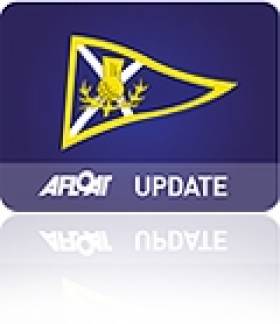Displaying items by tag: antix
Equinox and Antix Take Scottish Honours
A young Irish crew from Howth topped IRC Class 4, the biggest class which had 20 entries at the Scottish Series this evening. Ross McDonald and the crew of the Howth based X332 Equinox strung together a first and two second places from the final three races to win the class by four points from last year's class winners on the J92 NiJinsky. Robert Yates and his crew won both races today but finished second by four points ahead of the Davidson 36 Hops which had lead into the final day but which could only make a fifth and seventh today.
Anthony O'Leary and his Cork crew of the Ker 39 Antix conclusively won IRC Class 1 after posting a further two victories today in near perfect conditions. O'Leary, a long time supporter of the Scottish Series has won twice before in 2004 and 2006.
Counting six wins from eight starts in the nine boat strong class, Antix has been impressive across the wind ranges, proving the team are in good shape for the upcoming Rolex Commodore's Cup international team regatta in August.
Their class had depth including another three past winners of the overall top trophy in second, third and fourth places.
After more than three decades of trying with probably as broad a variety of different yachts that any one owner-skipper has campaigned at this key regatta with - from a slippery 37 foot ultra light Selection production race boat to a heavy Trintella 42 foot cruising boat - veteran Clyde owner-skipper John Corson and his long serving crew of the immaculately prepared Corby 33 Salamander XX lifted the Scottish Series Trophy, the top award for the annual Brewin Dolphin Scottish Series this evening.
"I am shocked and stunned." Said an emotional Corson, 80. " I don't know what to say. We have been so close so many times before that you just never know what is going to happen, or who it is going to go to. So I think most of all I just feel so relieved."
His win is a popular one. Corson has been a huge supporter of Clyde racing, and perhaps the most zealous participant over many years, competing from early season frostbite races right through until December year in year out. He has introduced many youngsters
His win, along with a crew of whom some have sailed with him for nearly 20 years, comes after many near misses. The veteran shed a tear or two before accepting the top trophy, just as his team did in 2005 when they were leading their class with a string of wins when their mast crashed down and their regatta was ended prematurely.
"This is a really, really special thing for John. He has always wanted to win this. In a sense this is his Olympics, the biggest thing in sailing for him so it is a real honour to have contributed. We have been close before, but this time things came together. After last year we had plugged the gaps which we felt we might still have in terms of optimising the boat, the crew work is really exemplary and the result of many long hours on the water over the years. So this is very special." Said John Highcock, the Clyde sailmaker who steered Salamander XX.
"It is so well deserved. Totally right." Commented double winner Anthony O'Leary
Corson and his crew won seven of their eight races in IRC Class 3, dropping an eighth as their allowable discard. With Clyde sailmaker John Highcock steering, Salamander XX's performance today was nothing short of electric. Twice today they were quick enough to be ahead of the leaders of Class 2 which had started five minutes ahead.
IRC Class 2 went right to the final race with the Clyde brothers Richard and Paul Harris triumphing after posting a third and a second on their Iain Murray designed Sydney 36.
The challenge from the Welsh-Irish new Corby 36 Roxy 6 faded notably in the lighter conditions of Sunday. Chris Bonar's BH36 Bateleur 97 finished with a flourish, two first places today, but that was not enough for them to catch their Clyde compatriots and they had to settle for third overall.
The only crew to have won all of their races right the way through the regatta is Ruairadh Scott's team on King Quick in Sportsboat Class 1. They counted eight first places from nine starts and were certainly among the elite group of contenders for the overall top trophy.





























































